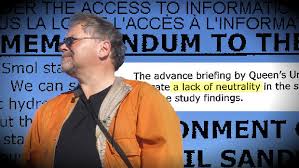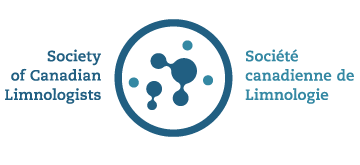[The following post will appear as an Opinion Editorial in our upcoming issue of our newsletter, "The Current". Please visit back for the release of the latest issue next week. While you're there, check out some of our past issues as well.]
 This summer, member John Smol was the focus of some surprising and unusual attention. Freedom of Information requests by journalist Tom Korski had unearthed internal government documents (dated Feb 8, 2013) authored by the then Deputy Minister to the Minister of Natural Resources Canada accusing Dr. Smol of “a lack of neutrality” in his communications around a paper he co-authored with a post doc in his lab (Joshua Kurek) and government scientists at Environment Canada, and bemoaned the level of media attention the paper received.
This summer, member John Smol was the focus of some surprising and unusual attention. Freedom of Information requests by journalist Tom Korski had unearthed internal government documents (dated Feb 8, 2013) authored by the then Deputy Minister to the Minister of Natural Resources Canada accusing Dr. Smol of “a lack of neutrality” in his communications around a paper he co-authored with a post doc in his lab (Joshua Kurek) and government scientists at Environment Canada, and bemoaned the level of media attention the paper received.
Dr. John Smol is among the most highly decorated and recognized scientists in the country. A past Rigler Award winner for his achievements in Limnology (1995), Dr. Smol is a Fellow of the Royal Society of Canada and an Officer of the Order of Canada, to abridge a long list of accolades and recognition for his outstanding work as a scientist.
The documents disclosing the accusations, while made internally, are telling of how both the government and industry have aligned their messaging on the issue (click here for the briefing and industry response). Both the media speaking points for EC scientists (none of whom I recall being quoted in the media) and the response from the Canadian Association of Petroleum Producers chose to focus on the fact that the levels of PAH’s detected were similar to others found elsewhere, and that zooplankton in these lakes were unaffected by PAH’s. Neither mention the exponential rate of increase in PAH levels in lake sediments since the development of the region, nor the fact PAH’s rise sharply in proximity to development (it is notable that both these observations are made in the briefing to the Minister, but are absent from the media speaking points). Both findings are important facts brought forward by the study, and the omission of a major component of those findings by both a government agency tasked with regulating industrial effects on the environment, and the industry it is meant to regulate, is disturbing.
It is difficult to understand how a fact that is clearly outlined in the ministerial briefing is grounds to accuse Dr. Smol for “lacking neutrality”. He simply was able to relay the information in the study to the general public, something both EC and industry chose not to do.
It is additionally confounding how a science-based department (NRCan) seems unaware of the communications process that accompanies the publication of articles that journals wish to promote, like the one in question. The complaint by the department that Dr. Smol gave pre-publication (but embargoed) interviews to the media that requested them is to complain about how science communication works, and is often journal policy (for example, in this case, the Proceedings of the National Academy of Sciences releases a pre-print of the paper and their press releases, under embargo, five days before publication to the media). I would find it very surprising if the communications department from Environment Canada were left totally out of the loop on this in the development of this work and preparation of authors to speak to the articles findings. Indeed, the preparation of speaking points by the department for it’s scientists suggests exactly the opposite.
It is already bad enough that our government scientists are faced with policies that so heavily restrict their communication of scientific findings to the public, much more so than our counterparts in the USA (as illustrated in a recent report by Evidence for Democracy and Simon Fraser University). At the same time, government departments are facing growing restrictions on budgets, and are encouraged to find university partners who can help fill gaps in expertise left by these cuts. It is therefore counterproductive for the government to accuse these collaborators of bias when they simply report the findings of the study, or participate in the communication of the study results to the media. These measures will only act to discourage academic partnerships in the future.

Submit a CommentPlease be polite. We appreciate that.